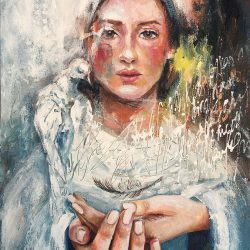- HOME
- ABOUT ME
- movies
- MEDIA
- L.Onerva
- Eino Leino
- Eeva-Liisa Manner
- Erään Opon päiväkirja
- Elämänkenttäni
- Elämäni ”viiva”
- Käyttöteoriani – se miten minä ohjaan
- Kulttuuritietoinen ja kansainvälistyvä ohjaus
- Ohjauksen järjestäminen maahanmuuttajakoulutuksessa
- Ohjauksen yhteiskunnallinen viitekehys
- Ohjaukäsite
- Oma opiskeluorientaatio
- Opiskelijoiden yksilöllisyys ohjauksessa
- EETTISET KYSYMYKSET
- Psykososiaalisen kehityksen teoria
- Suhteeni erilaisuuteen ja tehtäväni opinto-ohjaajana
- Opinto-ohjauksen ja erityisopetuksen yhtäläisyyksiä ja eroja
- Kehitykseni opinto-ohjaajana
- Maahanmuuttajan uraohjaus
- Maahanmuuttajien ohjaus ja neuvonta: kuka, mitä, miten?
- Ohjauksen tulevaisuus
- Elämänkenttäni
- Mariana Marin
- Claudiu Komartin
- Mariana Codrut
- Roland Erb
- Romanian poetry
- ESSAYS
- STORIES
- CLASSIC POETRY
- CONTEMPORARY POETRY
- TRANSLATED POEMS
- READING POETRY
- CONTACT
- translated Italian-English
- translated Italian-Romanian
- translated Spanish-English
- translated Spanish-Romanian
Mariana
MUTILAREA ARTISTULUILA TINERETE / ARTIST’S MUTILATION IN YOUTH
POSTED IN Mariana November 21, 2021
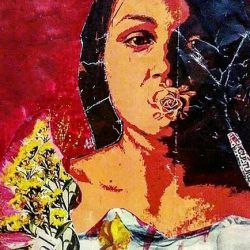
MUTILAREA ARTISTULUILA TINERETE / ARTIST’S MUTILATION IN YOUTH
O casă nouă,
ca un alt mormânt,
mai aproape parcă de cel definitiv,
mai aproape de ceasul
pentru care atât am trudit..
Nu mai aveam încredere în mine.
Dispăruse furnica de la care învăţasem
să pun pe picioare orice dezastru,
să înving fără să rănesc
nici măcar aerul pe care-l respir..
Până şi poezia
(ea, urmând existenţa, niciodată înlocuind-o)
uitase să mai pună
sticla de lapte în faţa uşii.
Uitase să-şi mai aducă aminte de mine..
Atunci s-a întâmplat.
Printre dărâmături şi abur proaspăt de ceai
s-a aşezat la masa mea,
a aranjat cu grijă
cele două-trei firimituri insomniace de pâine,
şi-a aplecat uşurel capul (ciudă copilăroasă!)
în semn de trecerea timpului,
a bolborosit printre colţoasele-i falduri:.
“încrederea în sine vine şi pleacă
după cum de la început
ai stat ghemuit la pământ
sau ai privit stelele drept în faţă..
Vei mai răsturna zaruri
şi lehamitea te va îmblânzi
în dulce scorpie parfumată.
Vei mai atârna de obsesii
cu acelaşi scris larg la pungă,
până când frumuseţea va zornăi
şi-n casa săracului
şi-n galeria de cârtiţă..
Vei mai da ceva de ronţăit gurilor rele
precum sexul, alcoolul
şi pisica ruptă-n două din suflet..
Te vei golăni tot mai mult.
Doar la apusul soarelui
vei începe cu adevărat să trăieşti
printre tufişuri şi sperme galinacee
de refacere a echilibrului psihic..
Va râde lumea de tine
când în pas cocoşat
vei debita despre munci şi zile
cu pagina albă..
Va hohoti duhoarea de proastă
agăţată de alţii mai proşti decât tine
dar cu şfanţ şi cu ştaif,
numit stil câteodată”..
O casă nouă,
ca un alt mormânt,
mai aproape parcă de cel definitiv,
mai aproape de ceasul
pentru care atât am trudit.
MARIANA MARIN (Madi)
……………….ARTIST’S MUTILATION IN YOUTH
A new house,
like another grave,
closer to the final one,
closer to the hour
for which I toiled so hard.
.
I didn’t trust myself anymore.
Gone was the ant from whom I’d learned
to get any disaster up and about,
to win without hurting
even the air I breathe.
.
Even poetry
(it, following the existence, never replacing it)
had forgotten to put
the milk bottle in front of the door.
It had forgotten to remember me.
.
Then it happened.
Amidst the rubble and fresh tea steam
sat down at my table,
arranged carefully
the two or three insomniac crumbs of bread,
bowed its head slightly (childish spite!)
as a sign of the passage of time,
muttered through its crooked folds:
.
“Self-confidence comes and goes
as from the beginning
you’ve been crouching on the ground
or staring straight ahead at the stars.
.
You’re gonna roll some more dices
and the disgust will tame you
into a sweet-scented shrew.
You’re gonna hang on to obsessions
with the same generous handwriting,
until the beauty shall rattle
in the poorhouse
as well in the mole’s gallery.
.
You’re gonna give to the bad mouths some more to nibble on
such as sex, alcohol
and the torn in two cat from the soul.
.
You will get more and more naughty.
Only at sunset
will you truly begin to live
among bushes and fowl sperms
to restore mental balance.
.
People will laugh at you
when with a hunched step
you’ll talk of toils and days
with a blank page.
.
Will roar the stench of dumb girl
hanging on to others dumber than you
but with a buck and swagger,
sometimes called style ”.
.
A new house,
like another grave,
closer to the final one,
closer to the hour
for which I toiled so hard.
traducere, Maria Magdalena Biela
TINERETE FARA ARTA / YOUTH WITHOUT ART
POSTED IN Mariana November 15, 2021
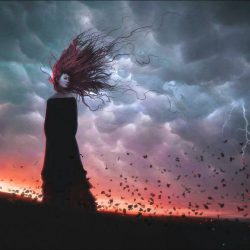
TINERETE FARA ARTA / YOUTH WITHOUT ART
Când m-am apropiat de treizeci de ani
a început vârtejul.
In jur dezastrul devenea tot mai intens,
niciodată nu ştiam
dacă a doua zi vom mai fi în viaţă,
dacă nu se va rupe arcul,
dacă rotiţele n-o vor lua dracului la vale.
Eram aidoma unor biserici ameninţate cu demolarea
– fapt care exista şi în realitate
pe care îl puteam pipăi cu privirea zilnic
în oraşul meu prăfuit.
Clopotele îmi băteau turbate sub piele,
în creier
şi nu puteam să mă întreb pentru cine.
Ştiam.
De la un anotimp la altul,
ba poate mai des,
rămâneam tot mai puţini.
Una dintre fete spunea
că am devenit nişte ciocli.
Mi-era frică de telefoanele de la miezul nopţii
prin care ne anunţau moartea prietenilor
şi transa în care intram cu toţii
la înmormântări.
Şi din atâtea gâtleje ale minţii
urletul mut: cine urmează?
Când tocmai am împlinit treizeci de ani
aveam în spate o zestre frumuşică de morţi
şi între patru pereţi mă împiedicam zilnic
de un geamantan cu prieteni plecaţi
– un fel de moarte şi-aceasta
pentru cei care rămâneam în viaţă aici.
Acum sunt singură.
Doar maimuţoiul ăsta dement agăţat de funii
lustruindu-le
cu rânjetul satârului ca un stindard,
trage în continuare clopotele
privindu-mă oarecum curios
cu mila lui băloasă îmbrăţişându-mă
peste atâta bătrâneţe fără de moarte
şi tinereţe fără de artă.
MARIANA MARIN
—————————————YOUTH WITHOUT ART
When I was about thirty
the whirlwind began.
All around the disaster was getting more and more intense,
we never knew
if we’d be alive the next day,
if the spring wouldn’t break,
if the wheels won’t go the goddamn downhill.
We were like churches threatened with demolition
– a fact existing also in reality
which I could feel with my glance every day
in my dusty city.
The church bells were tolling frenetically under my skin,
in my brain
and I couldn’t ask myself for whom.
I knew it.
From one season to the next,
maybe even more often,
there were fewer and fewer of us left.
One of the girls kept saying
that we’d become a couple of grave-diggers.
I dreaded the midnight calls
announcing the death of our friends
and the trance we were all going into
at the funerals.
And from so many throats of the mind
the mute howl: who’s next?
When I just turned thirty
I had a nice dowry of the dead behind me
and between four walls, I stumbled daily
over a suitcase with gone friends
– a kind of death too
for those of us who remained alive here.
Now I’m alone.
Only this demented aper hanging on the ropes
polishing them
with the cleaver’s grin like a banner,
still talling the church bells
looking at me somewhat curious
with his slobbering mercy hugging me
over so much consenescence without death
and youth without art.
traducere, Maria Magdalena Biela
SANGEROSII UTOPISTI / THE BLOODY UTOPISTS
POSTED IN Mariana November 15, 2021
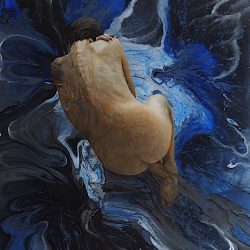
SANGEROSII UTOPISTI / THE BLOODY UTOPISTS
lui Nicolae Manolescu
si a batut ceasul din turn
si ei s-au ridicat de la masa;
si a stralucit ceasul pe mana marelui padurar
si ei au inceput vanatoarea;
si a tipat ceasul de fier
si ei si-au slefuit unghiile.
Nu-ti fie teama, cititorule!
Am parasit conventia cocosata a trecerii timpului.
Rad de ceasul din turn, de ceasul de mana,
de ceasul de aur, de ceasul de fier
In alta parte ne va purta sarmana pasare
pre versuri tocmita.
Cenusa de sub aripa ei sînt si nu de cenusa ma tem.
Nu de arc, nu de sageata ma tem.
Rad de ceasul din turn, de ceasul de mana,
de ceasul cu cuc!
Te tin de mana atat de strans nu pentru ca
te-as putea pierde.
Nu ai unde merge.
Nimeni nu calatoreste, cititorule!
Numai trupul – un ochi vast.
Numai trupul – privit de un ochi fix.
Numai trupul – inghitit de o gura care vede.
Eu te privesc atat de atent
nu pentru ca as vedea in oasele tale o statuie de sange.
Nu pentru asta te privesc atat de atent.
Nu te mai teme, cititorule!
si a batut ceasul din turn
si ei au sfarsit vanatoarea;
si a stralucit ceasul pe mana marelui padurar
si ei s-au asezat la masa;
si a tipat ceasul de fier
si ei au adormit in unghiile lor istorice.
Ea a deschis usa cu gesturi mici
dar adevarul e ca nu a mai ramas nimic
din ultimii cititori rataciti in sala de lectura.
Un razboi de o suta de ani, i-au suras
si a batut ceasul din turn
si ei s-au ridicat de la masa;
si a stralucit ceasul pe mana marelui padurar
si ei au inceput vanatoarea;
si a tipat ceasul de fier
si ei si-au innoit unghiile lor istorice.
‘Totusi de-a lungul deceniilor de tranzitie, aceasta cultura n-a zacut in somn, ci tocmai in timpul descompunerii si al aparentei sale autoabandonari savarsite prin artisti, profesori si foiletonisti a cunoscut o stare de cea mai ascutita vigilenta si auto analiza. Chiar in miezul perioadei de inflorire a foiletonului existau pretutindeni grupe izolate si mici, decise sa ramana devotate spiritului si sa se straduiasca din rasputeri pentru a salva, pana dupa scurgerea acestei perioade, un graunte din traditia sanatoasa, bunele moravuri, metodele si constiinta intelectuala.’
(Hermann Hesse – Jocul cu margele de sticla)
Un razboi de o suta de ani!
Radem de ceasul din turn, de ceasul de mana
de ceasul de aur, de ceasul de fierNumai trup inghitit
de o gura care vede.MARIANA MARIN
…………………………
THE BLOODY UTOPISTS
to Nicolae Manolescu
and the clock tower struck
and they rose from the table;
and the wristwatch of the great forester shone
and they began the hunt;
and iron clock screamed
and they polished their nails.
Don’t be afraid, reader!
I left the hunchbacked convention of the passage of time.
I laugh at the tower clock, the wristwatch,
the gold watch, the iron watch
Elsewhere, the poor bird written on the lyrics
will carry us.
I am the ashes under her wing and I am not afraid of the ashes.
I’m not afraid of the bow, not the arrow.
I laugh at the tower clock, at the wristwatch,
at the cuckoo clock!
I’m holdind your hand so tightly not because
I could lose you.
You have nowhere to go.
Nobody travels, reader!
Only the body – a wide eye.
Only the body – looked at with a fixed eye.
Only the body – swallowed by a seeing mouth.
I look at you so closely
not because I would see a statue of blood in your bones.
That’s not why I’m looking at you so closely.
Don’t be so afraid, reader!
and the tower clock struck
and they finished the hunt;
and the wrist watch of the great forester shone
and they sat down at the table;
and the iron clock screamed
and they fell asleep in their historical nails.
She opened the door with small gestures
but the truth is that there is nothing left
of the last readers lost in the reading room.
A hundred-year war, they smiled at her
and the tower clock struck
and they rose from the table;
and the wrist watch of the great forester shone
and they began the hunt;
and the iron clock screamed
and they’ve renewed their historic nails.‘However, during the decades of transition, this culture did not fall asleep, but precisely during its decomposition and its apparent self-abandonment committed by artists, teachers and columnists it experienced a state of sharpest vigilance and self-analysis. Even in the midst of the flowering period of the pamphlet there were isolated and small groups everywhere, determined to remain devoted to the spirit and to strive hard to save, until the passing of this period, a grain of healthy tradition, of good morals, of methods and intellectual conscience.’
(Hermann Hesse – The glass bead game )
A hundred-year war!
We laugh at the tower clock, the wristwatch
at the gold watch, the iron watch
Only body swallowed
of a seeing mouth.
traducere, Maria Magdalena Biela
SEMNUL / THE SIGN
POSTED IN Mariana November 10, 2021
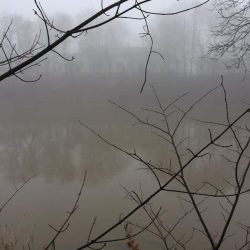
SEMNUL / THE SIGNExistă aici un fel de a fi minoritar
chiar şi atunci
când trăieşti în cea mai neagră majoritate.
Asta ţine de felul în care înţelegi
să-ţi petreci zilele mai ales în tinereţe,
când stratul de minciună pare mai subţire.
Bunăoară, poţi începe o nouă zi
prin intonarea uşoară a Internaţionalei
sau a unui cântecel din copilăria ta săracă.
Totuna: nu o vei sfârşi niciodată
la o masă decentă
în plină perioadă de înfometare a poporului.
Asta poate părea complicat pentru unii.
Dacă ţi se întâmplă să fii şi poet
atunci lucrurile se simplifică uimitor.
Nici n-apuci bine să te desparţi
de bucuria poemului cald
că el te şi situează în afara realităţii
pe care atât o iubeşti,
despre care scrii,
la vindecarea căreia vrei să participi,
dar pe care n-o mai suporţi
aşa cum îţi este băgată zilnic pe gât.
Cât despre mine,
reprezentantă a majorităţii
în patria mea minoritară,
cu această mână tremurătoare
când îmi duc bucata de pâine la gură,
nu am prea multe de spus.Acum la Frankfurt este iarnă.
Iarnă este şi aici.
în Siberia este iarnă.De acolo, de sus,
Rolf Bossert îmi face semn să nu tac,
să continui
iar eu îi răspund cu creierul meu lăbărţat
peste toate aceste trei lumi deodată.
MARIANA MARIN————————-
THE SIGN
There’s a way of being a minority here
even when
when you live in the darkest majority.
It’s about how you understand
to spend your days, especially in your youth,
when the layer of lies seems thinner.
For example, you can start a new day
by lightly singing the Internationale
or a song from your poor childhood.
However: you’ll never end it
at a decent meal
in the midst of starvation of the people.
This may seem complicated to some.
If you happen to be a poet
then things are amazingly simplified.
No sooner have you parted
with the joy of the warm poem
than it also places you outside the reality
you love so much,
that you write about,
the healing you want to participate in,
but which you can no longer bear
as it is shoved down your throat every day.
As for me,
the representative of the majority
in my minority homeland,
with this trembling hand
when I put the piece of bread in my mouth,
I don’t have much to say.Now it’s winter in Frankfurt.
It’s winter here, too.
In Siberia it’s winter.From up there,
Rolf Bossert beckonst me not to shut up,
to continue
and I answer him with my brain strewn
over all three worlds at once.
English version, Maria Magdalena Biela
DESPARTIREA / THE SEPARATION
POSTED IN Mariana November 10, 2021
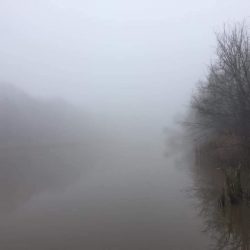
DESPARTIREA / THE SEPARATION
Cu ochii îngroziţi privesc degradarea
– carne albă a peştelui şi a pâinii apără-mă!
Mă mişc printre tăceri şi morminte.
Aici – felul în care am împietrit şi eu
într-un noiembrie greu, prietene.
Alături – o masă de carne putredă.
Să-ţi imaginezi despărţirea de patrie
când singură dimineaţa stai în faţa paginii.
Auzi scrâşnetul
şi maşinăria începe să meargă: poeme
despre ceea ce aş fi putut deveni
dacă bâlciul de dincolo de fereastră
ar fi avut ritmul inimii mele.
Poeme despre partizanii din munţii sufletului.
Poeme de dragoste ca şopârlele cu coada tăiată.
Poeme despre gunoaie.
Poeme cu ochi umezi de câine.
Poeme despre prietenii dispăruţi sau pierduţi.
Poeme despre acizii sulfurici din minte,
vomitatul harnic şi sila, frumuseţea pierdută,
sărăcia, orbirea şi frica.Şi cum mai huruie maşinăria asta, mamă,
cum mai huruie…Să-ţi imaginezi despărţirea de patrie
şi o bătaie groasă în uşă
să te trezească.S-a întâmplat de mult
şi tocmai în mijlocul patriei.MARIANA MARIN
—————————–
The separation
With horrified eyes I watch the decay
– white flesh of fish and bread protect me!
I move among silences and graves.
Here – the way I froze
on a hard November too, my friend.
Beside – a table of rotting flesh.
Imagine parting from your homeland
when alone in the morning you stand before the page.
You hear the creak
and the machine starts running: poems
about what I could have become
if the fair beyond the window
had the rhythm of my heart.
Poems about the partisans in the mountains of the soul.
Love poems like lizards with their tails cut off.
Poems about garbage.
Poems with wet dog eyes.
Poems about missing or lost friends.
Poems about sulfuric acids in the mind,
the industious vomiting and the coercion, the lost beauty,
poverty, blindness and fear.And how this machine roars, Mother,
how it roars…Imagine the separation from your homeland
and a heavy knock on the door
to wake you up.It’s been a long time
and right in the middle of the homeland.
English version, Maria Magdalena Biela
DASCALITA / THE SCHOOLMARM
POSTED IN Mariana November 5, 2021
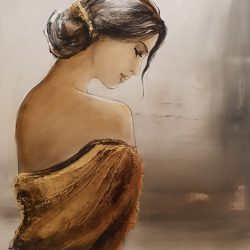
DASCALITA / THE SCHOOLMARMîntr-o dimineață,
să te trezești în brațe cu o realitate doldora,
– ca producția de oțel pe cap de locuitor!
Să o mângâi ușor pe creștet.
Să-i spui vorbe de dragoste.
Să-i rupi (din iubire) un deget.
Ehei, cum încep personajele să existe!
în vagonul nr. 11
viață ta se lipește strâns de geamurile murdare
– și își cheamă în ajutor rudele și prietenii, pisica și câinele,
zăpada de anul trecut și mătăniile
O realitate doldora,
care începe și sfârșește într-o gară de câmpie,
unde oamenii urâți și negricioși te privesc cu ciudă, pentru că ai studii
și ești trăsnită și șuie
Așa, tăvălită în trenciul tău alb,
pari un spion industrial,
căruia i-au scos cu forcepsul melancolia (și frica lui de mămică!)
Nu, de ce să verși!
Uite, pe iubitul acesta nou,
îl vei părăsi la fel de sărac și cu părul alb.
Nu, de ce să muști!
Pisica și câinele?
Zăpada de anul trecut și mătăniile?
Șobolanii decenți ai orașelor?
Vorbe.
Povestește-le mai departe copiilor “Cei trei mușchetari’ și mai ales
nu uita să le spui că nici unul nu scapă.
Ei doar se prefac.
MARIANA MARIN
…………………………THE SCHOOLMARM
one morning,
to wake up to a crammed reality ,
– like the steel production per capita!
To pat it lightly on the head.
To tell it words of love.
To break (out of love) its finger.
Hey, how characters begin to exist!
in the carriage number 11
your life clings tightly to the dirty windows
– and calls for help the relatives and friends, cat and dog,
last year’s snow and the rosaries
A crammed reality,
that begins and ends in a plain station,
where ugly, blackish people look at you with a frown because
you’re educated
and you’re lunatic and willowy
Like that, rolled up in your white trench coat,
you look like an industrial spy,
who’s had its melancholy removed with the forceps (and his fear of mother!)
No, why throw up!
Look, this new boyfriend,
you’ll leave just as poor and grey-haired.
No, why bite!
The cat and the dog?
Last year’s snow and the rosaries?
The decent city rats?
Words.
Tell the kids more about ‘The three musketeers’ and especially
don’t forget to tell them that none of them gets away.
They’re just pretending.
translated by Maria Magdalena Biela
Elegie – Ducem o viață dublă / Elegy – We lead a double life
POSTED IN Mariana November 5, 2021

Elegie – Ducem o viață dublă / Elegy – We lead a double lifeDucem o viață dublă.
Aici poemul, visul brutal, lecția despre verb,
rotativa lui mâine și ieri.
Dincolo de fereastră urechea destinului,
săpând liniștită, în toamna de câlți.
Mai presus de orice,
există acest echilibru pântecos.
Ce nebunie, îți spui prea târziu,
să supraviețuiești articulând fericit
nenorocirile altora!
Dar urechea destinului
sapă liniștită în toamna de câlți,
unde tu potrivești mistere
în ficțiuni pentru orbi:
Aici, personajul fericit,
pe un acoperiș înverzit,
îngână magii de sub pleoape.
Dincolo, cineva care te-a părăsit
meșterește la trecutul lui singur.
Într-o parte a minții
se iau la harță vieții și sfinții.
În cealaltă parte a morții
forfotesc și declamă minciunii și sorții.
Apoi, nu mai știi: sub pleoape e gheață la mal
și rotativa lui mâine și ieri
înghite poemul, masa, visul brutal,
lecția despre verb…
Ai mâinile goale și grele.
Aici, albite de spaimă.
Dincolo de fereastră,
săpând liniștite, în toamna de câlți.MARIANA MARIN
……………………………..
Elegy – We lead a double life
We lead a double life.
Here the poem, the brutal dream, the lesson about the verb,
the spin of tomorrow and yesterday.
Beyond the window the ear of destiny,
in the fall of tow digging quietly.
Above all,
there is this bellied balance.
What madness, you tell yourself too late,
to survive by happily articulating
the misfortunes of others!
But the ear of destiny
in the fall of tow digs quietly,
where you fit mysteries
into fictions for the blind:
Here, the happy character too,
on a roof green in hue
mumbles magics under the eyelids.
Beyond, someone who has left you
is crafting his own past.
In one part of the mind
quarrel the living and the saint kind.
On the other side of the death
bustle and rant the liers and the faith.
Then you know no more: beneath the eyelids is ice on the shore
and the spin of tomorrow and yesterday
swallows the poem, the table, the brutal dream,
the lesson about the verb …
Your hands are empty and heavy.
Here, whitened with fright.
Beyond the window,
digging quietly in the fall of tow.
traducere, Maria Magdalena Biela
Orez cu lapte în Praterstrasse / Rice pudding in the Praterstrasse
POSTED IN Mariana September 26, 2021
Orez cu lapte în Praterstrasse / Rice pudding in the Praterstrasse
Trăiam între rai și iad la propriu,
eram supli, nervoși, ne tăceam
cu o mătăsoasă duioșie unul pe altul,
ne ștergeam coșmarurile,
ne făceam paturile, ghetele,
ne dam pe gheața ei de viață.
Uneori observam realitatea.
Atunci, ceva se ghemuia
în colțul cel mai umbros al casei
și începea să ne scâncească la piept.
Era un pui de realitate, ca și noi.
Singur și trist, șoptea printre lacrimi
„Luați-mă și pe mine între rai și iad!
Băltoaca asta în care trăiesc m-a obosit.
Nu-mi mai pot mânca nici măcar orezul cu lapte,
nu mai are gust de atâtea gunoaie pisate,
de atâtea cuvinte îngâmfate și reci.”
Ce să faci cu un pui de realitate
care-ți scâncește la piept?
L-am luat cu noi, între rai și iad.
Pare mai vesel de atunci
sau, oricum, mai echilibrat.
Își mănâncă pofticios orezul cu lapte
și, lucru rar la un pui de realitate,
visează cu ochii deschiși
și se prăpădește de râs.
E molipsitor.
(Mariana Marin)…………………
Rice pudding in the Praterstrasse
We were living between heaven and hell literally,
we were slender, nervous, we’d silence
each other with a silky tenderness,
we’d wipe our nightmares,
we’d make our beds, our boots,
we’d go skating on goddamn ice of life.
Sometimes we’d notice reality.
Then something would squat
in the darkest corner of the house
and would begin to whimper in our chests.
He was a reality-cub, just like us.
Alone and sad, whispering through tears
“Take me also between heaven and hell!
This puddle in which I live made me tired.
I can’t even eat my rice pudding anymore,
it’s tasteless because of all the crushed rubbish,
all the smug and cold words”.
What to do with a reality-cub
who whimpers in your chest?
We took it with us, between heaven and hell.
He seems happier since then
or, anyway, more balanced.
He eagerly eats his rice pudding
and, which is odd for a reality-cub,
he dreams with his eyes open
and bursts out laughing.
It’s contagious.
traducere, Maria Magdalena Biela

Copyright © 2024 by Magdalena Biela. All rights reserved.
